24 Country Liquors & Homemade Alcohols
We’ve put together for you, a list of desi alcoholic beverages that you can only find at certain places in India, alphabetically. Of course, a lot of the times these homemade alcohol in India are extremely dangerous since there arent any precautions or standardised recipes. But it’s still good knowledge to get high on.
Apong, Assam
Apong is a rice beer made prepared by fermenting rice and is traditionally prepared by the Mising (or Mishing) tribe of Assam. The Adi people of Arunachal Pradesh prepare it in their household too.
The Mishing Apong comes in two varieties – Nogin Apong and Poro: Apong. The Nogin Apong is whitish in colour, while the Poro: Apong has a darker, greenish colour. The method of preparation of the two is different, and so are the colours and flavours.
The Nogin Apong’s fragrance is outstanding and that’s enough for you to keep sipping it. It turns out to be quite potent and the fun lies in the fact that the fermentation is not controlled and therefore, there is no fixed amount of alcohol content in the bottle, which means every bottle could surprise you in its own distinct way. It’s protected as a product of Mising tribe’s traditional knowledge and only they can control it’s production and distribution.
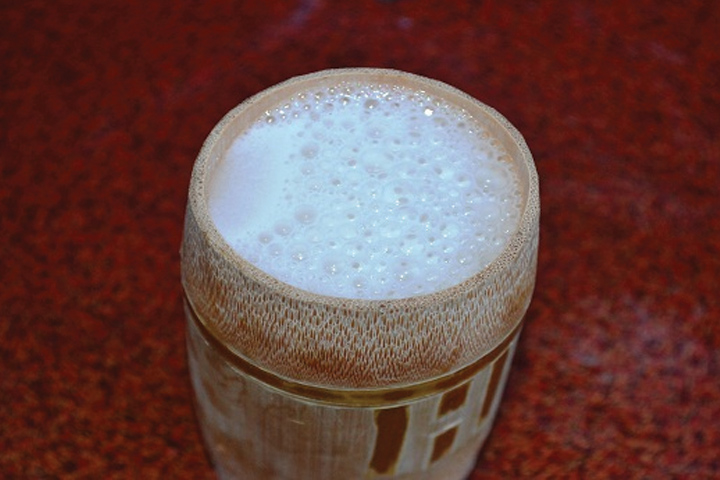
Bangla, West Bengal
This country liquor is made from fermented molasses and often goes by the name ‘Kali Mata’ since it is offered during Kali puja. More often than not, it contains spurious elements, and so it is to be consumed with caution.
Chhang, Sikkim
This is a relative of beer, and either barley or millet are used to brew this home-made concoction. It is served by stuffing the semi-fermented seeds of the millet in a barrel made of bamboo called dhungro. Boiling water is then poured in through a narrow bamboo tube called a pipsing. Chhaang is usually drunk piping-hot in brass bowls or wooden mugs in cold weather and is served at room temperature in the summer.
Chuwarak, Tripura
Chuwarak is a distilled variety of local alcohol, much like whisky. You wouldn’t be advised to call home after two glasses since it is so high in alcoholic content. Chuwarak is produced from rice, pineapples, and even jackfruit.
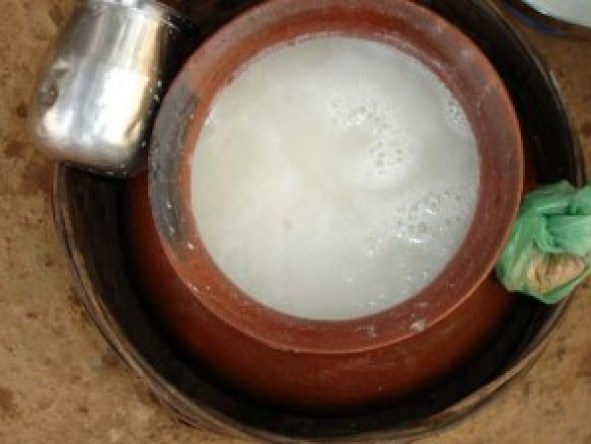
Feni, Goa
Feni (sometimes spelt fenny) is a spirit produced exclusively in Goa. There are two types of feni—cashew feni and toddy palm feni, depending on the original ingredient. Feni is classified as a “country liquor”, and is therefore not allowed to be sold outside the state of Goa.
Anyone who is excited to have a go at it does so because of its ample usage in Bollywood’s vernacular whilst depicting drunk youth of Goa, but its blandness is disappointing and the pungent smell may teleport you to your school’s chemistry lab in no time.
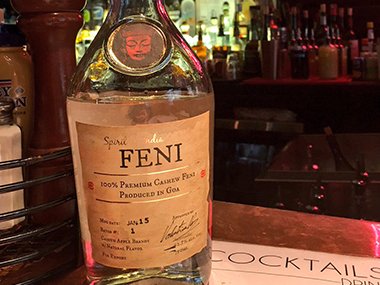
- Handia, Jharkhand
Handia (also known as Hadiya) is a rice beer made by the indigenous people of Bihar, Chattisgarh, Jharkhand, and Uttar Pradesh. Ranu tablets, which are a mix of about 20-25 herbs that act as fermenting agents, are mixed together with boiled rice and are left to ferment. It takes about a week to get the end product. The drink is served cool and has a lower alcoholic strength than most local Indian liquors.
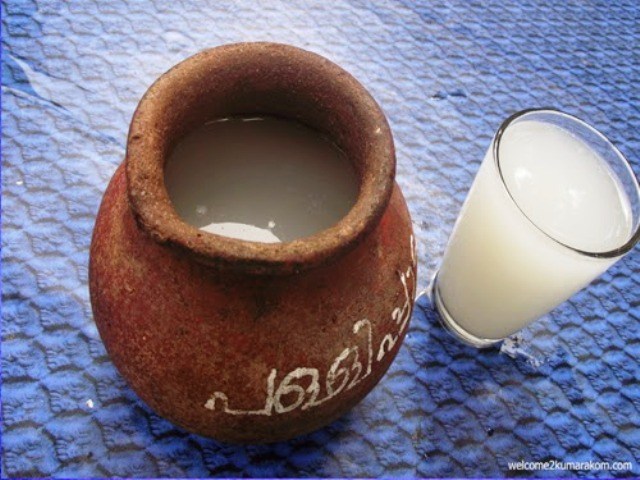
- Hariya
Hariya is another one of the many Northeast Indian beers made from rice. It is mainly prepared and drunk by the Santhal and Munda people. Bakhars (a kind of cookie made with wheat flour, herbs and yeast) are mixed with boiled rice and left to ferment. The fermentation is complete within 2-3 days, and the resultant hariya is served cool in a leaf-he!
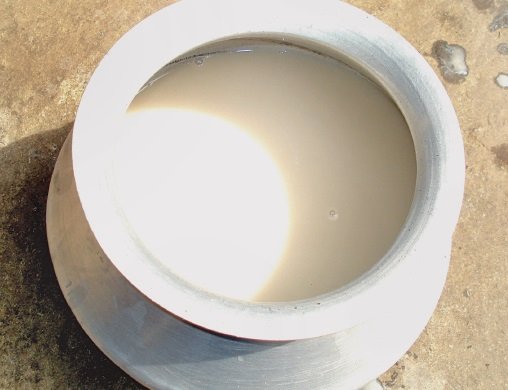
- Judima, Assam
Judima is a traditional drink of the Dimasa people of Assam and is essentially made from fermented rice. It is much like wine and is enjoyed at all occasions—even the ones where they’re grieving.
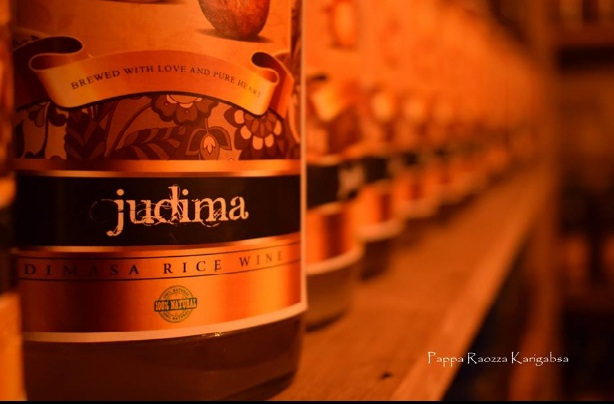
Kesar Kasturi, Rajasthan
This royal liquor from Rajasthan is much like whisky and contains a blend of as many as 21 secret spices—kasturi being one of them. This is only consumed during extremely special occasions, and it is had in small amounts so you don’t get inebriated too quickly. Harsh on the throat initially but extremely soothing after a few sips, especially when it’s 9 degrees outside. Try it with Thumbs Up if you must.
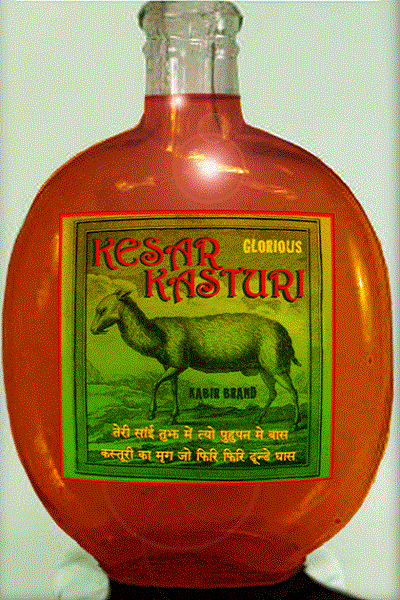
Kiad, Meghalaya
Kiad is Meghalaya’s take on the many rice beer available in the Northeast region of India. It is traditionally served in bamboo tumblers. Locals generally put a piece of charcoal in their glass to balance the sweetness and alcohol levels of this tart, sweet drink.
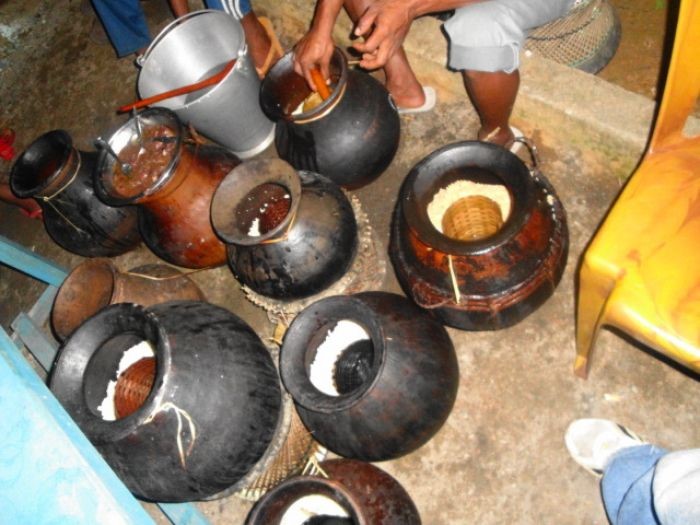
- Kinnauri Ghanti, Kinnaur
Kinnauri Ghanta or Chulli is made with a smooth blend of apples and apricots. It has the texture of cognac and has many healing properties. It is transparent like vodka and smells like apple juice. The locals prefer to mix it with water. Depending on your taste, you can try it with a fizzy drink.
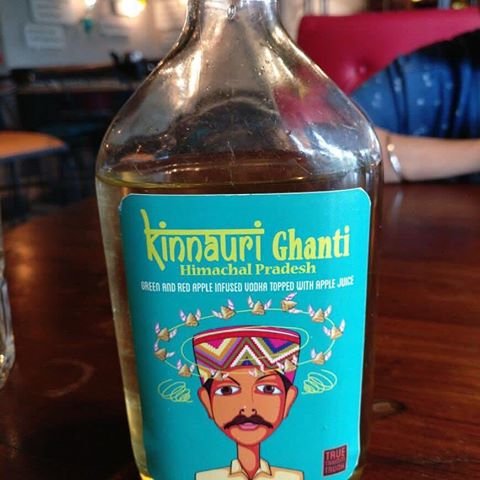
- Kodo ko Jaanr, Sikkim
This is a hot beer from Sikkim, made from fermenting the dried seed of the finger millet. ‘Jaanr’ is the common name given to alcoholic drinks in Nepali. Kodo Ko Jaanr is prepared by adding boiling hot water to the tumbler containing it and then served.
Lugdi, Manali
Lugdi is crude yet refreshing but works extremely well after a long day of walking in Manali. This rice beer is made from fermented rice or barley and is found in the plains and the Himalayan parts of Manali. Closer to the mountains, you’re more like to find versions of Chhang, and when you distill the liquid, you get Arak.Mahua, Maharashtra
drinks country liquor Category:Drinks alcohol drinks country liquor Category:Drinks alcohol
Photo Courtesy Of: Wikimedia Commons
Mahua flowers are fermented to produce the alcoholic drink Mahua (or Mahuwa), a country liquor. Mahua is an essential drink for the tribal men and women during celebrations. The main ingredients used for making it are sugarcane molasses and dried mahua flowers. The liquid produced is mostly colourless, and isn’t very strong.
Raksi, Sikkim
Raksi is a traditional distilled alcohol made in Sikkim, and parts of Nepal and Tibet. It is usually made of millet or rice—the different grains produce different flavours. It is quite strong and tastes somewhat like the Japanese sake, and is clear like vodka.
The drink is so strong that it is known to send a burning sensation down your throat that turns into a smooth, velvety sensation. Locals drink this to celebrate festivals and other joyous occasions.Sonti
Another rice-based alcoholic beverage, it resembles sake (the Japanese rice wine) in its alcohol strength and use. It is made from steaming rice to convert the starches to sugar and is later fermented.Sunda Kanji, Tamil Nadu
This liquor original to Tamil Nadu is often made from fermenting rice that is buried in earthen or mud pots covered with cloth and is more commonly found near the slums in Chennai, where it is served with curd. You’ll also find hawkers selling fried fish to go with it.
drinks country liquor Category:Drinks alcohol drinks country liquor Category:Drinks alcohol drinks country liquor Category:Drinks alcohol
Sulai, Assam
Sulai is a rectified spirit (distilled more than once) brewed in Assam. It is a clear, colourless alcohol, Sulai is also known as ‘tharra’ in north India, ‘handia’ or ‘pheni’ in Nepal, and is generally referred to as country liquor. It is usually brewed from fermented molasses, or occasionally, rice.Sura
Sura is a strong, distilled alcoholic beverage that was used as an anaesthetic by surgeons, many centuries ago and it is still consumed for its health benefits,It is prepared by fermenting a mixture of water, flour of rice, jaggery resembling the beer of the present day.Tharra
Tharra is a locally produced alcohol in North India and is found in other parts of the country too. It is often brewed illegally and is made from yeast fermentation of sugar cane or wheat husk. Since it is usually made from sugarcane, it is often viewed as a crude form of rum. It tastes like death. We know someone who had it at 5 in the evening, passed out around 7 and woke up at 1 pm the next day. Ideally, it should be consumed neat or at least that’s what your neighbourhood watchman will tell you.Toddy/ Tadi/ Kallu/ Pada neera
drinks country liquor Category:Drinks alcohol drinks country liquor Category:Drinks alcohol drinks country liquor Category:Drinks alcohol drinks country liquor Category:Drinks alcohol
Photo Courtesy Of: Wikimedia Commons
Palm wine is known as toddy (Kerala), tadi (West Bengal), neera/pada neera (Tamil Nadu), and kallu (Andhra Pradesh) in various parts of India. The toddy tappers go about tapping the liquid from palm trees between 7-10 a.m. and go about selling it during the rest of the day. The flavour varies from region to region, depending on the collection and fermentation process.
Xaj, Assam
Like the many rice beers of the Northeast, the Ahoms ferment rice with herbs to make this brew. The drink is only served in copper containers, and it is rumoured that they dip their newborn children in the beer right after they’re born, for good luck.Zawlaidi, Mizoram
If you’re not a huge fan of grain alcohol, you should get their local wine called Zawlaidi. Made from the locally produced grapes in Mizoram, and contains about 11-14% alcohol. It is cheaper than the other alcoholic beverages that the state produces, too.Zutho, Nagaland
Nagaland produces three main types of rice beer namely Dzutse, Ruhi and Zutho — Zutho being the most popular of the three. The taste is somewhat sour and the beer itself has a fruity aroma. The drink is fermented in different ways by the different tribes in Nagaland, but the taste, however different it may be, never fails to amaze.
like your post a lot... i'm also from India ..new in this site.. hope you do like my post https://steemit.com/writings/@imbsnt/where-i-like-to-see-myself-in-future